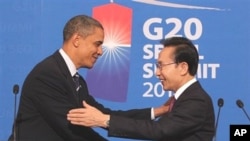The United States and South Korea have failed to meet a self-imposed deadline to alter their stalled free trade agreement. It is a setback for South Korea as it holds the Group of 20 leaders' summit and for the U.S. president wanting to demonstrate an American commitment to trade.
The presidents of the United States and South Korea had hoped to announce a re-worked free trade agreement on Thursday. But their trade negotiators could not bridge differences about cars and cows.
South Korean President Lee Myung-bak, at a news conference with President Barack Obama, said negotiators are being asked to reach a deal as quickly as possible.
Mr. Lee says the talks will resume following the Group of 20 leaders' summit.
President Obama expressed confidence an agreement can be reached in the next several weeks.
"I think that President Lee is sincere in wanting to get this done. My goal is reciprocal trade. That is a win-win for both countries. I think that can be achieved," he said.
The U.S. wants South Korea to relax auto emission standards for imported vehicles and to resume wider imports of American beef.
The U.S. argues South Korea's vehicle standards discriminate against American cars and trucks, which have less than a one percent market share here.
While there had been signs Seoul appears willing to make concessions on vehicles, it is holding firm on the beef imports. South Korea's government considers that issue politically volatile, recalling street protests that lasted for months after Seoul partially reopened its market to U.S. beef in 2008. Imports were cut because a case of mad-cow disease was found in the U.S.
U.S. officials traveling with Mr. Obama said those issues were the main sticking points in the talks. They said negotiators made progress, but the two countries' leaders decided to give the teams more time to talk.
Mr. Obama and Mr. Lee agreed last week in a phone call to push to resolve differences on the deal before the G20 summit opens later Thursday.
The free trade agreement was signed in 2007 by previous administrations in Seoul and Washington, but has not received legislative endorsement in either country.
The agreement is the largest such pact for the United States since the North American Free Trade Agreement of 1994. It is expected to boost annual U.S.-South Korean trade by a quarter.
Setback for US, South Korea on Free Trade Pact




